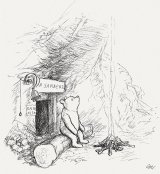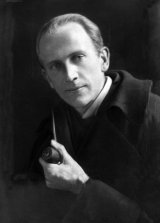Winnie-the-Pooh Page #5
"Winnie-the-Pooh" is a delightful children's book written by A. A. Milne. Set in the Hundred Acre Wood, the story follows the adventures of a lovable bear named Winnie-the-Pooh and his friends, including Christopher Robin, Piglet, Eeyore, Tigger, Rabbit, and Owl. Each chapter brings a new escapade, often involving honey, Pooh's favorite treat. From searching for the North Pole to getting stuck in Rabbit's front door, the characters embark on whimsical journeys full of humor, friendship, and simple joys. The book's charm lies in its gentle lessons about kindness, imagination, and the importance of treasuring the little things in life.
"No," said Pooh, "because it makes different marks. It is either Two Woozles and one, as it might be, Wizzle, or Two, as it might be, Wizzles and one, if so it is, Woozle. Let us continue to follow them." So they went on, feeling just a little anxious now, in case the three animals in front of them were of Hostile Intent. And Piglet wished very much that his Grandfather T. W. were there, instead of elsewhere, and Pooh thought how nice it would be if they met Christopher Robin suddenly but quite accidentally, and only because he liked Christopher Robin so much. And then, all of a sudden, Winnie-the-Pooh stopped again, and licked the tip of his nose in a cooling manner, for he was feeling more hot and anxious than ever in his life before. There were four animals in front of them! "Do you see, Piglet? Look at their tracks! Three, as it were, Woozles, and one, as it was, Wizzle. Another Woozle has joined them!" And so it seemed to be. There were the tracks; crossing over each other here, getting muddled up with each other there; but, quite plainly every now and then, the tracks of four sets of paws. "I think," said Piglet, when he had licked the tip of his nose too, and found that it brought very little comfort, "I think that I have just remembered something. I have just remembered something that I forgot to do yesterday and shan't be able to do to-morrow. So I suppose I really ought to go back and do it now." "We'll do it this afternoon, and I'll come with you," said Pooh. "It isn't the sort of thing you can do in the afternoon," said Piglet quickly. "It's a very particular morning thing, that has to be done in the morning, and, if possible, between the hours of----What would you say the time was?" "About twelve," said Winnie-the-Pooh, looking at the sun. "Between, as I was saying, the hours of twelve and twelve five. So, really, dear old Pooh, if you'll excuse me----What's that?" Pooh looked up at the sky, and then, as he heard the whistle again, he looked up into the branches of a big oak-tree, and then he saw a friend of his. "It's Christopher Robin," he said. "Ah, then you'll be all right," said Piglet. "You'll be quite safe with him. Good-bye," and he trotted off home as quickly as he could, very glad to be Out of All Danger again. Christopher Robin came slowly down his tree. "Silly old Bear," he said, "what were you doing? First you went round the spinney twice by yourself, and then Piglet ran after you and you went round again together, and then you were just going round a fourth time----" "Wait a moment," said Winnie-the-Pooh, holding up his paw. He sat down and thought, in the most thoughtful way he could think. Then he fitted his paw into one of the Tracks ... and then he scratched his nose twice, and stood up. "Yes," said Winnie-the-Pooh. "I see now," said Winnie-the-Pooh. "I have been Foolish and Deluded," said he, "and I am a Bear of No Brain at All." "You're the Best Bear in All the World," said Christopher Robin soothingly. "Am I?" said Pooh hopefully. And then he brightened up suddenly. "Anyhow," he said, "it is nearly Luncheon Time." So he went home for it. CHAPTER IV IN WHICH EEYORE LOSES A TAIL AND POOH FINDS ONE The Old Grey Donkey, Eeyore, stood by himself in a thistly corner of the forest, his front feet well apart, his head on one side, and thought about things. Sometimes he thought sadly to himself, "Why?" and sometimes he thought, "Wherefore?" and sometimes he thought, "Inasmuch as which?"--and sometimes he didn't quite know what he was thinking about. So when Winnie-the-Pooh came stumping along, Eeyore was very glad to be able to stop thinking for a little, in order to say "How do you do?" in a gloomy manner to him. "And how are you?" said Winnie-the-Pooh. Eeyore shook his head from side to side. "Not very how," he said. "I don't seem to have felt at all how for a long time." "Dear, dear," said Pooh, "I'm sorry about that. Let's have a look at you." So Eeyore stood there, gazing sadly at the ground, and Winnie-the-Pooh walked all round him once. "Why, what's happened to your tail?" he said in surprise. "What has happened to it?" said Eeyore. "It isn't there!" "Are you sure?" "Well, either a tail is there or it isn't there. You can't make a mistake about it. And yours isn't there!" "Then what is?" "Nothing." "Let's have a look," said Eeyore, and he turned slowly round to the place where his tail had been a little while ago, and then, finding that he couldn't catch it up, he turned round the other way, until he came back to where he was at first, and then he put his head down and looked between his front legs, and at last he said, with a long, sad sigh, "I believe you're right." "Of course I'm right," said Pooh. "That Accounts for a Good Deal," said Eeyore gloomily. "It Explains Everything. No Wonder." "You must have left it somewhere," said Winnie-the-Pooh. "Somebody must have taken it," said Eeyore. "How Like Them," he added, after a long silence. Pooh felt that he ought to say something helpful about it, but didn't quite know what. So he decided to do something helpful instead. "Eeyore," he said solemnly, "I, Winnie-the-Pooh, will find your tail for you." "Thank you, Pooh," answered Eeyore. "You're a real friend," said he. "Not like Some," he said. So Winnie-the-Pooh went off to find Eeyore's tail. It was a fine spring morning in the forest as he started out. Little soft clouds played happily in a blue sky, skipping from time to time in front of the sun as if they had come to put it out, and then sliding away suddenly so that the next might have his turn. Through them and between them the sun shone bravely; and a copse which had worn its firs all the year round seemed old and dowdy now beside the new green lace which the beeches had put on so prettily. Through copse and spinney marched Bear; down open slopes of gorse and heather, over rocky beds of streams, up steep banks of sandstone into the heather again; and so at last, tired and hungry, to the Hundred Acre Wood. For it was in the Hundred Acre Wood that Owl lived. "And if anyone knows anything about anything," said Bear to himself, "it's Owl who knows something about something," he said, "or my name's not Winnie-the-Pooh," he said. "Which it is," he added. "So there you are." Owl lived at The Chestnuts, an old-world residence of great charm, which was grander than anybody else's, or seemed so to Bear, because it had both a knocker and a bell-pull. Underneath the knocker there was a notice which said: PLES RING IF AN RNSER IS REQIRD. Underneath the bell-pull there was a notice which said: PLEZ CNOKE IF AN RNSR IS NOT REQID. These notices had been written by Christopher Robin, who was the only one in the forest who could spell; for Owl, wise though he was in many ways, able to read and write and spell his own name WOL, yet somehow
Translation
Translate and read this book in other languages:
Select another language:
- - Select -
- 简体中文 (Chinese - Simplified)
- 繁體中文 (Chinese - Traditional)
- Español (Spanish)
- Esperanto (Esperanto)
- 日本語 (Japanese)
- Português (Portuguese)
- Deutsch (German)
- العربية (Arabic)
- Français (French)
- Русский (Russian)
- ಕನ್ನಡ (Kannada)
- 한국어 (Korean)
- עברית (Hebrew)
- Gaeilge (Irish)
- Українська (Ukrainian)
- اردو (Urdu)
- Magyar (Hungarian)
- मानक हिन्दी (Hindi)
- Indonesia (Indonesian)
- Italiano (Italian)
- தமிழ் (Tamil)
- Türkçe (Turkish)
- తెలుగు (Telugu)
- ภาษาไทย (Thai)
- Tiếng Việt (Vietnamese)
- Čeština (Czech)
- Polski (Polish)
- Bahasa Indonesia (Indonesian)
- Românește (Romanian)
- Nederlands (Dutch)
- Ελληνικά (Greek)
- Latinum (Latin)
- Svenska (Swedish)
- Dansk (Danish)
- Suomi (Finnish)
- فارسی (Persian)
- ייִדיש (Yiddish)
- հայերեն (Armenian)
- Norsk (Norwegian)
- English (English)
Citation
Use the citation below to add this book to your bibliography:
Style:MLAChicagoAPA
"Winnie-the-Pooh Books." Literature.com. STANDS4 LLC, 2025. Web. 21 Jan. 2025. <https://www.literature.com/book/winnie-the-pooh_2005>.




Discuss this Winnie-the-Pooh book with the community:
Report Comment
We're doing our best to make sure our content is useful, accurate and safe.
If by any chance you spot an inappropriate comment while navigating through our website please use this form to let us know, and we'll take care of it shortly.
Attachment
You need to be logged in to favorite.
Log In